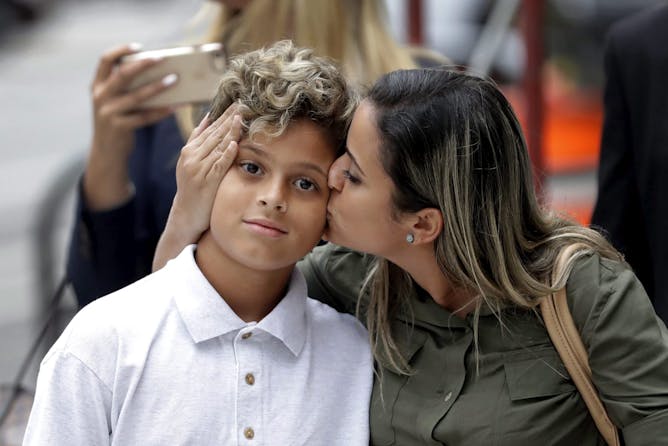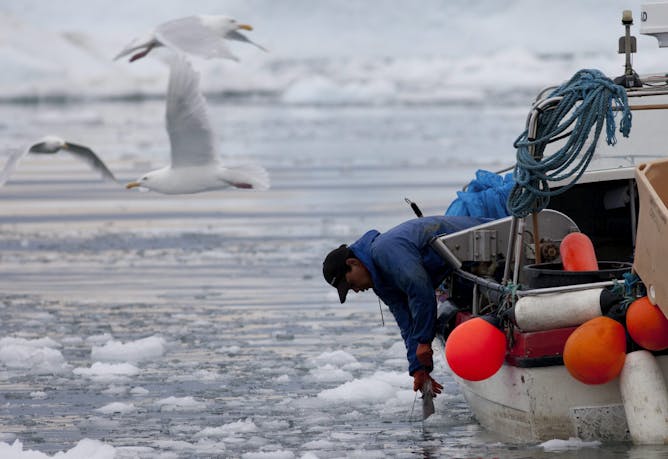|
The fate of immigrant children in the United States separated from their parents has been one of the major stories of 2018. But today in The Conversation Canada, Jerry Flores of the University of Toronto and Kati Barahona-Lopez of the University of California, Santa Cruz, tell us about at an underreported issue involving migrant children – how some kids have been given sedation drugs without the knowledge or permission of their parents. These “chemical straitjackets” are wrong and most likely illegal.
Twenty-five years ago this month, Bill Clinton brought Israeli Prime Minister Yitzhak Rabin and Palestinian leader Yasser Arafat to the White House to sign a peace accord. Philip Leech-Ngo of University of Ottawa looks at how successive U.S. administrations, including Donald Trump, have failed the Palestinian people.
Four scholars from the University of British Columbia – Ryan Stillwagon, Adriana Brodyn, Amin Ghaziani and Kyle Sutherland – have done research into how Vancouver’s changing urban landscape has impacted gay neighbourhoods. As the city changes, “queer pop ups” have become important gathering places.
And finally…Charles Levkoe of Lakehead University explains “agroecology” – more equitable and sustainable methods of producing food that are not only possible, but are beginning to spread around the world.
Regards,
|

Sirley Silveira Paixao, an immigrant from Brazil seeking asylum, kisses her 10-year-old son Diego Magalhaes, after he is released from immigration detention in Chicago on July 5, 2018.
(AP Photo/Charles Rex Arbogast, File)
Jerry Flores, University of Toronto; Kati Barahona-Lopez, University of California, Santa Cruz
Psychotropic medication is 'pharmaceutical violence' against migrant children and other incarcerated youth throughout the United States. Drug addiction is one consequence.
|

In this September 1993 photo, U.S. President Bill Clinton presides over White House ceremonies marking the signing of the peace accord between Israel and the Palestinians with Israeli Prime Minister Yitzhak Rabin, left, and Palestinian leader Yasser Arafat, right, in Washington.
(AP Photo/Ron Edmonds)
Philip Leech-Ngo, University of Ottawa
Donald Trump's strong defence of Israel might be more boisterous than his predecessors, but it's consistent with the anti-Palestinian policies by previous U.S. administrations.
|

Innovative queer pop-ups challenge arguments about the death and demise of queer spaces in the city. Here an image from 2069 Sci-fi Kiki Vogue Ball of the Future presented in collaboration with Ricecake, Vancouver.
John Bello/Facebook
Ryan Stillwagon, University of British Columbia; Adriana Brodyn, University of British Columbia; Amin Ghaziani, University of British Columbia; D. Kyle Sutherland, University of British Columbia
Rapacious gentrification in Vancouver is part of the story and struggle for queer residents but queer pop-ups offer some respite.
|

In this July 2011 photo, an Inuit fisherman pulls in a fish on a sea filled with floating ice.
(AP Photo/Brennan Linsley)
Charles Z. Levkoe, Lakehead University
A recent summit in Ottawa on what's known as agroecology has shown that more equitable and sustainable methods of producing food are not only possible, they're beginning to spread around the world.
|
Politics
|
-
Eileen M. Ahlin, Pennsylvania State University
Young people of color are disproportionately affected by the lifelong consequences of having a criminal record.
|
|
Health + Medicine
|
-
Shane Nanayakkara, Baker Heart and Diabetes Institute; Anna Beale, Monash University
The new Apple Watch is making waves for being able to record an electrocardiogram (ECG) and share it. An ECG can tell you what's going on with your heart.
|
|
Science + Technology
|
-
Giuliana Mazzoni, University of Hull
Research sheds light on how we pick and choose among distorted memories to create our identity. But is that a bad thing?
|
|